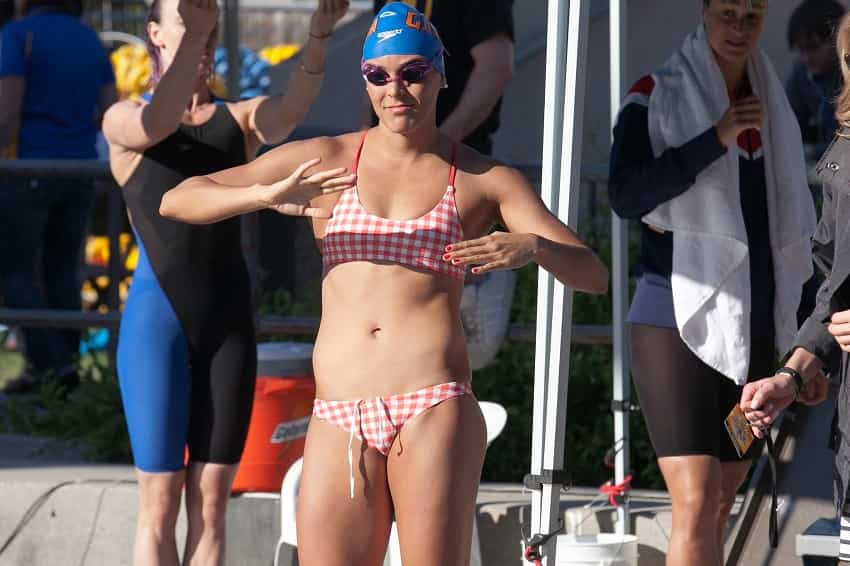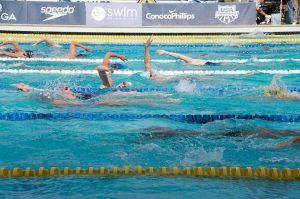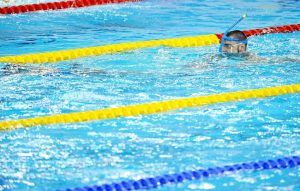
6 Reasons Why Swimmers Do Better in School
Swimmers often excel academically, proving that success in the pool can translate to success in school. Here’s a look at why swimmers kick fast in the pool and kick butt in the classroom.

If you have been a competitive swimmer for any length of time you don’t need me to sell you on the health benefits of length swimming. Or maybe you have been swimming so long that you need a gentle reminder.
The sport provides us a lot. It serves as a proving ground for setting goals, learning resilience, and developing ridiculously good looking physiques. (“Hey everyone, come see how good I look!”)
There are a lot of reasons to celebrate the sport.
Here are just 7 of the benefits of swimming:
Yes, “low impact” means different things for different people. Someone who swims 1000m with perfect technique twice a week is going to experience a different range of impact than a swimmer who belts out 10k a day with sloppy and uneven form (hello there, misuse injuries and swimmer’s shoulder).
The buoyancy of the water removes the jarring impact that comes from most dryland activities. Swimming is a resistance exercise without lots of impact, with research showing that it can still provide bone strength benefits.
Competitive swimmers are whiz kids when it comes to breaking down splits and stroke counts. All that lap counting in the water, adding of times, and continuous focus helps us better concentrate in other areas of life.
(Meaning we can be forgiven for losing count during a 200m once in a while. For the last time I’m sorry coach!)
Research into young Australian, New Zealander and American kids has shown that swimming makes you smarter. And who doesn’t like to be better edumacated?
You don’t hear members of the opposite sex swoon over Football Body. Or Golf Body. But you mention swimmer’s body and people know exactly what you are talking about.
Boulder-shouldered, broad back, lean and strong, swimming gives us a physique that is the envy of the sporting world.
Drowning is the leading cause of death for kiddos between the age of 1-4, and is the second leading cause of injury in children between the ages 1-14. Over the past decade the United States alone averages over 3,500 drowning deaths per year. That is about ten every single day.
Staggering when you think about.
The biggest benefit of swimming goes far beyond making a Speedo look good, or building up that voracious and legendary appetite, or growing over-seized shoulders and lats—it’s being alive, man.
Learning to swim gives us the confidence, awareness and competency to better navigate the pools, lakes and streams in our lives.
For most of us (particularly readers of this site), swimming came to us at an early age. We can hardly remember a time when the pool and all of the glory and misery that came along with it wasn’t a major part of our life.
Whether a water baby or not, the sport is something that will always be there for us in life.
For some this means joining a Masters team, for others it means going down to the local YMCA to do some solo laps, and for others it means floating around the splash pool with the next generation of water babies.
See Also: Do Swimmers Get Injured More Often Than Other Athletes?
The sport can be done quite easily solo or with a club.
You already know the perks to training on your own; going solo gives you the “masters prerogative” (i.e. write your own sets, include generous amounts of hot tubbing), and gives you the quiet and disconnect from day-to-day life.
On the other hand, swimming with a local team or organization provides you the structure and social kick that comes with training towards a common goal.
Unlike most sports and physical activities, you can throw attention and effort at various parts of your body as needs dictate. Want a basic, full body workout? Swim. Want to hammer your upper body? Do some pull work with a band. Want some thicker stems? Throw on some fins. How about a deadly core workout? Roll on your back, streamline and dolphin kick your abs into submission.
This ability to target different parts of your body means that compared to sports and activities like running, biking, and most team sports, you can train somewhat easily around injuries.
The versatility extends to the type of training you want to do as well. For you endurance-based athletes there are endless laps and sets you can do to continue expanding your “base.” Similarly, for the short twitch monsters among us engaging in a series of blast 15-yard or 25-yard sprints can quite easily (and enjoyably) feed the beast.
For most readers of this site these benefits of swimming will be old news. Or maybe you have been doing it so long that you have forgotten life without it.
Whichever the case, this is your daily reminder that swimming is kinda-sorta the best.
12 Things Non-Swimmers Should Never Say to a Swimmer. They live among us, the non-chlorinated. Here are just some of their greatest hits when it comes to trying to understand our sport.
7 Reasons You Should Absolutely Date a Swimmer. Because we are ridiculously good looking and have big shoulders. Plus 6 more.

Olivier Poirier-Leroy Olivier Poirier-Leroy is the founder of YourSwimLog.com. He is an author, former national level swimmer, two-time Olympic Trials qualifier, and swim coach.
✅ Free shipping on Orders over $49
✅ Price Match Guarantee
✅ Best selection of gear for training and competition
✅ Fast and Easy Returns

“This is the best book I have ever seen concerning mental training.” — Ray Benecki, Head Coach, The FISH Swim Team


Swimmers often excel academically, proving that success in the pool can translate to success in school. Here’s a look at why swimmers kick fast in the pool and kick butt in the classroom.

As someone who trains almost exclusively during open lap periods I have experienced more than my fair share of lane ragey moments. Last night, for instance, a family of four head up breaststrokers jumped into the fast lane and breaststroke’d their way up the middle of the lane. When I

The swim goggle is a fundamental part of our training and our racing. Like the smell of chlorine, soggy suits between practices, and the occasional kickboard getting thrown at our heads, it’s an essential part of our sport. Swim goggles help us see underwater, see the competition, and see our

Here are 16 ways that every swimmer makes their swim coach go a little bit crazy. Sorry coach!

The journey becoming a competitive swimmer is fun, challenging, and unique. Here are 26 things you learn becoming a competitive swimmer.
SITE
SHOP
GUIDES

LANE 6 PUBLISHING LLC © 2012-2025
Join 33,000+ swimmers and swim coaches learning what it takes to swim faster.
Technique tips, training research, mental training skills, and lessons and advice from the best swimmers and coaches on the planet.
No Spam, Ever. Unsubscribe anytime.
